Constructing Narratives about the Taliban by Russia’s Ministry of Foreign Affairs
DOI:
https://doi.org/10.21638/11701/spbu06.2019.208Аннотация
The paper focuses on the specifics of the Russian Foreign Ministry’s rhetoric about the Taliban Movement during the period between 1999 and 2018. Using a morphological approach to analysis of the narratives produced by the Ministry, it is demonstrated that the main characters within those narratives had gone through significant metamorphoses over the studied period, echoing the shifts in Russia’s self-identification and the latter’s perception of the relevant actors, as well as in its policy towards Afghanistan. Thus, Russia no longer seeks the approval of the international community, nor does it speak like a partner of the West. Rather it tends to act alone by taking the initiative of bringing the Afghan warring parties together at the negotiating table in Moscow. Russia’s representation of the Taliban Movement went a full circle from “a real force existing in Afghanistan” to “a criminal force” that has no legitimacy and back to “an integral element of the Afghan society” with whom seeking a peaceful reconciliation is deemed necessary. Its representation of the United States, on the contrary, changed from “ally” to “foe.” Given that the Russian policy towards Afghanistan is heavily dependent on Russia’s relationship with the United States of America, and if the downward spiral of that relationship continues, one should expect it manifest in a more overt Russian support for the Afghan opposition, resulting in an indirect war by proxy between the two powers in Afghanistan.
Ключевые слова:
Russia’s Ministry of Foreign Affairs, Taliban, narrative construction
Скачивания
Библиографические ссылки
Watson, K. (1973), “A Rhetorical and Sociological Model for the Analysis of Narrative”, American Anthropologist, New Series, vol. 75, no. 1, pp. 243–264.
Propp, V. (1968), Morphology of the Folktale, University of Texas Press, Austin, USA.
De Fina, A.and Johnsone, B. (2015), “Discourse Analysis and Narrative”, in Tannen, D., Hamilton, H., and Schiffrin, D. (eds), The Handbook of Discourse Analysis, Blackwell Publishers, Malden, USA, pp. 152–167.
Mannheim, B. and Tedlock, D. (1995), “Introduction”, in Mannheim, B. and Tedlock, D. (eds), The Dialogic Emergence of Culture, University of Illinois Press, Urbana and Chicago, USA, pp. 1–32.
Hodges, A. (2015), “Intertextuality in Discourse” in Tannen, D., Hamilton, H., and Schiffrin, D. (eds), The Handbook of Discourse Analysis, Blackwell Publishers, Malden, USA, pp. 42–60.
Burk, K. (1941), The Philosophy of Literary Form, Louisiana State University Press, Louisiana, USA.
Burk, K. (1968), Counter-Statement, University of California Press, Berkeley, Los Angeles, USA and London, UK.
Bohn, S. (2014), “Russia’s Afghanistan Policy: An Irresolute Strategy for an Uncertain Future”, Comparative Strategy, vol. 33, no. 3, pp. 205–221.
Trenin, D. (2011), Post-Imperium: A Eurasian Story, Brookings Institution Press, Washington, USA.
Goffman, E. (1981), Forms of Talk, University of Pennsylvania Press, Philadelphia, USA.
Foucault, M. (1972), The Archaeology of Knowledge, Pantheon Books, New York, USA.
Загрузки
Опубликован
Как цитировать
Выпуск
Раздел
Лицензия
Статьи журнала «Вестник Санкт-Петербургского университета. Международные отношения» находятся в открытом доступе и распространяются в соответствии с условиями Лицензионного Договора с Санкт-Петербургским государственным университетом, который бесплатно предоставляет авторам неограниченное распространение и самостоятельное архивирование.




